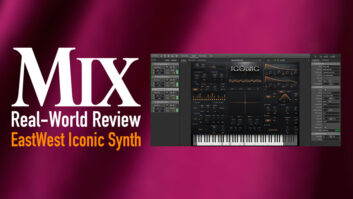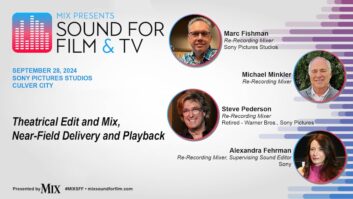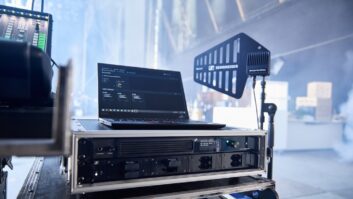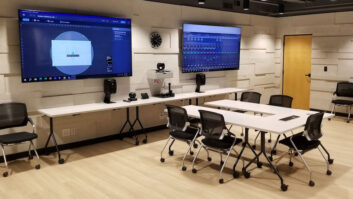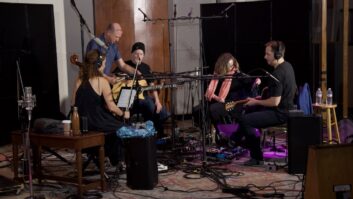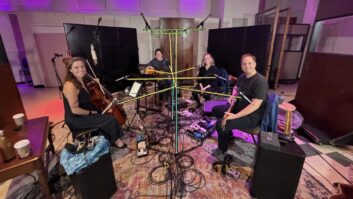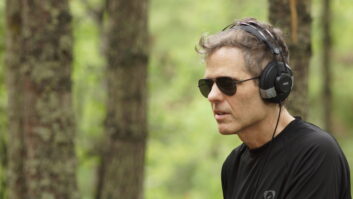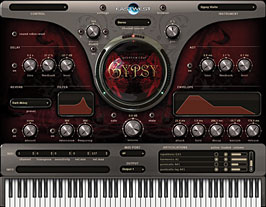
Following the model that was established two decades ago, most soft-sample libraries are released in one or more of the day’s popular formats. EastWest, which has observed this policy for some time, has broken the mold by releasing four new libraries — Fab Four, Voices of Passion, Ministry of Rock (which was not available when this review was written, but is now) and Gypsy — in its new PLAY format only.
As a sample playback engine, PLAY is well-designed and easy to use, and stands out from the pack with its 64-bit support, the first in the industry. This allows you to load many more instruments and voices, and is limited only by the host system’s RAM; 32-bit support is also included. All of this power translates into lush aural landscapes: For instance, the gorgeous convolution reverb’s impulse responses, plus the automatic double-tracking (applied most stunningly to the replications of Beatles sounds, but useful throughout), coupled with a silky stereo doubler, puts PLAY in a class of its own.
FAB FOUR
PLAY’s browser is standard fare. Assuming you’ve installed all of your libraries into a single PLAY folder, you’ll navigate through and load individual samples, or, more likely, either a Master or Elements patch. The two are essentially identical: Selecting the Master loads and activates all articulations, while choosing the Elements patch loads and activates single articulations to save system resources. I had a hard time understanding why the choice was made to include both, though a call to EastWest principal Doug Rogers showed me that having both options saves load time and efficiency. For example, say you’re playing a patch with release trails and you want to hear a sound without them. You can deactivate release trails and the samples remain loaded. When you activate them, they are right there without any additional load time.
Fab Four sound categories include bass, drums, guitars, keys and a miscellaneous folder that offers screaming girls and sitars. Although the drums and basses were recorded with the same scrupulous attention to detail, I found them to be of less interest than the keyboards and, in particular, the guitars in this library. The “Fixing a Guitar Solo” guitar sound captures its subject so well that after several run-throughs, I was almost unable to tell whether George Harrison’s line was coming from the Sgt. Pepper’s Lonely Hearts Club Band album in the CD tray or the software I was using to play along with it.
PLAY is multitimbral, so when you decide to load in the “Strawberry Flutes,” for example, you can choose to replace an existing sound or load it up in a seperate slot. However — especially if you’re relying on the convolution reverb or other DSP — watch out because PLAY is a resource hog. The company touts PLAY’s 64-bit capability, and it’s clear that the engine was designed for a time when most users will be using this technology.
Other highlights include spot-on replications of the trippy Lowery organ featured in “Lucy in the Sky,” and the Clavioline presets from “Baby You’re a Rich Man” and “Within a Sitar.” While the Fab Four samples are outstanding accurate reproductions of The Beatles’ sounds, I wondered whether they would have any practical value for today’s music production. The answer is, yes — they can be turned into aural tapestries that evoke an earlier era without being tethered to it.
VOICES OF PASSION
I almost jumped out of my seat the first time I instantiated this library and played a note — that’s how much personality these performances capture. The amount of attitude is the strength of this library and, in a sense, its limitation. Female singers from North America, Bulgaria, India, Syria and Wales were tracked, and EastWest made some very interesting decisions. For starters, the company abandoned Word Builder, the pioneering concept behind its Symphonic Choir library. Although it takes a bit of practice, Word Builder lets you type in text that the “singers” enunciate.
EastWest took a different tack with Voices of Passion. Instead of performing actual words, the Syrian ladies, for example, intone a series of pitched phrases that “sound” real — at least to my Western ears. The same holds true for the Indian and Bulgarian singers: Load the Bulgarian Master patch, and you’re presented with a series of chromatically pitched phrases that you can switch between. The mod wheel is critical to the execution of convincing performances. It filters the sounds and adds a great deal of nuance to them.
Given their length (roughly five to 10 seconds) and specific melodic content, you must use these performances in context. This may limit you to writing music that supports them with sustained pedal points and broad harmonies — perfect when you’re tapped to score the sequel to Black Hawk Down, but less useful in other styles.
Loading the Elements of the North American singers presents some great possibilities. The “doo” patch may bring out your inner Swingle Singers persona, and the “sigh” made me think Norah Jones had slipped in. These sounds and the other parts of the American Elements patch will work with many musical styles. All of this library’s sample sets have convincing legato and portamento, and they highlight the beauty of PLAY’s DSP.
The Gypsy library features sampled classical guitar with many articulations for sound design work.
GYPSY
Gypsy’s classical guitar is absolutely gorgeous, and I hope that EastWest adds to the articulations with which this instrument currently ships. The Spanish Guitar offers many of the articulations that are missing in the Classical Guitar. Along with the Django Style Guitar, these guitars will help you add authentic color to underscores and records. The accordions are spot-on, and the Flamenco Dancer is excellent. The solo violin in Gypsy is a standout. Throw in some pizzicato, harmonic and maybe some col legno samples, and this exquisitely recorded violin could fit in with any style of music.
LET’S PLAY!
Other sample players — the ubiquitous Kontakt engine in particular — do an admirable job of laying out the contents of a library and allowing you to shape sounds. Foregoing this path and creating a brand-new engine must have seemed a bit risky, considering the resources required. EastWest deserves high praise for the results. The DSP package — the convolution reverb and ADT in particular — is gorgeous.
EastWest is currently porting its entire library into the PLAY format. The company has also announced that it will release PLAY Pro, a 64-bit system that will be able to open other libraries, sometime in 2008. Prices: Voices of Passion, $495; Gypsy, $395; and Fab Four, $395.
EastWest, 800/833-8339, www.soundsonline.com.
